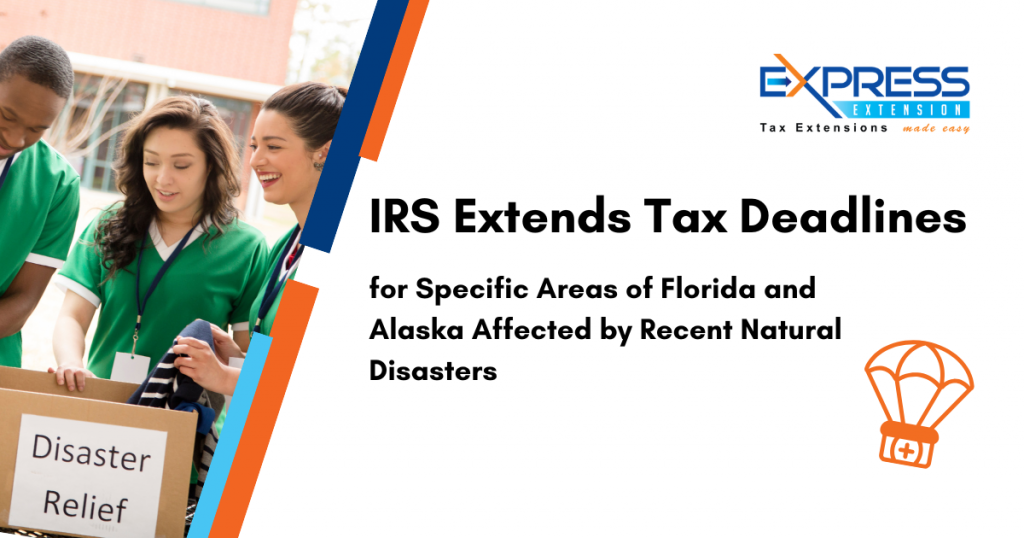IRS Extends Tax Deadlines for Specific Areas of Florida and Alaska Affected by Recent Natural Disasters
reading time: 11 minute(s)

The IRS has granted taxpayers in the disaster-affected areas of Florida and Alaska an extended deadline to file federal tax returns and make payments. This extension aims to provide relief for individuals, businesses, and nonprofits managing the challenges brought by the hurricane. Taxpayers now have until May 1, 2025, to meet their tax obligations.
In this blog, we will focus on the details of this tax relief and key information for organizations that have already acquired filing extensions through extension forms.
Who Qualifies for the Tax Extension?
The IRS has extended the tax filing deadline for Florida taxpayers to May 1, 2025, for filings due on or after October 5, 2024, until May 1, 2025. For Alaskan taxpayers, the deadline is similarly extended to May 1, 2025, for filings due on or after August 5, 2024, until May 1, 2025.
This extension applies to various categories of taxpayers, including individuals, businesses, tax-exempt, and nonprofit organizations.
The following deadlines are extended:
- Individual and business tax returns for 2024 are originally due in March and April 2025.
- Taxpayers who have a valid extension to file their 2023 returns now have until the new deadline.
Note: Payments on these returns do not qualify for the extension, as they were already due last spring.
- Quarterly estimated tax payments, including those due on January 15, 2025, and April 15, 2025.
- Payroll and excise tax returns, including Form 941 for the third and fourth quarters of 2024 and the first quarter of 2025, which are now due by May 1, 2025.
Additionally, IRS penalties on payroll and excise tax deposits due between October 5, 2024, and October 21, 2024, will be abated as long as the payments are made by October 21, 2024.
Areas Eligible for Tax Relief in Florida and Alaska
Following the Federal Emergency Management Agency (FEMA)’s disaster declaration, the IRS extended relief to taxpayers in the Juneau area of Alaska and for the following Florida counties:
Alachua, Baker, Bradford, Brevard, Broward, Charlotte, Citrus, Clay, Collier, Columbia, DeSoto, Dixie, Duval, Flagler, Gilchrist, Glades, Hamilton, Hardee, Hendry, Hernando, Highlands, Hillsborough, Indian River, Lafayette, Lake, Lee, Levy, Madison, Manatee, Marion, Martin, Miami-Dade, Monroe, Nassau, Okeechobee, Orange, Osceola, Palm Beach, Pasco, Pinellas, Polk, Putnam, Sarasota, Seminole, St. Johns, St. Lucie, Sumter, Suwannee, Taylor, Union, Volusia.
Are Organizations Who Already Obtained Filing Extensions Also Eligible for This Tax Relief?
Individuals, businesses, and nonprofit organizations that have obtained filing extensions through forms such as 8868, 4868, 7004, or 8809 remain eligible for tax relief if they are in designated disaster areas. The filing extension obtained by filing these extension forms does not affect this tax relief.
Tax Relief and Filing Deadlines for Other States
Earlier this year, the IRS provided similar tax relief to taxpayers in other states affected by natural disasters, providing them with tax filing and payment extensions. Here are some upcoming deadlines:
- November 1, 2024: Taxpayers in parts of Arkansas, Iowa, Kentucky, Mississippi, New Mexico, Oklahoma, Texas, and West Virginia.
- February 3, 2025: Taxpayers in Louisiana, Vermont, Puerto Rico, the Virgin Islands, and certain areas of Arizona, Connecticut, Illinois, Kentucky, Minnesota, Missouri, New York, Pennsylvania, South Dakota, Texas, and Washington State.
| Tax Relief for Washington State In response to the recent wildfires in Washington, the IRS has extended the filing deadlines for various federal and business tax returns. For the tax returns originally due on or after June 22, 2024, and before February 3, 2025, the deadline has been extended to February 3, 2025. |
- May 1, 2025: Taxpayers in Alabama, Florida, Georgia, North Carolina, South Carolina, and parts of Tennessee, Virginia, and Alaska.
The Bottom Line
By offering additional time to file and pay taxes, the IRS helps relieve some of the financial pressures faced by taxpayers in hurricane-affected areas of Florida. It’s crucial for eligible taxpayers to take advantage of these extensions and ensure they remain compliant with their tax obligations.
For more updates on tax deadlines and IRS notifications, stay connected!

Leave a Comment